2016 Yamaha Apex X-TX Review
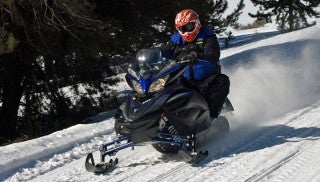
This power cruiser is Yamaha's best kept secret
Yamaha Apex owners know a huge secret. One that just got better for model year 2016.
Engine Type:Horizontal In-line
Cylinders:4
Engine Stroke:4-Stroke
Valve Configuration:DOHC
Displacement:998 / 60.9
Starter:Electric
Turbocharged:No
View Full SpecYamaha’s 2016 Apex X-TX models are the best power cruisers on the snow. Start with the exceptionally smooth power of its snowmobile-specific Genesis 998cc four cylinder four-stroker. When Yamaha added its EXUP tuned exhaust system to the 2011 Apex, it created an even smoother runner, but one with an absolutely ferocious midrange to top end end kick. Now five years forward, every Apex owner simply thinks this is how all Apex models ever were. Not so, but that addition is one key reason we feel that the 2016 Apex is snowmobiling’s ultimate power cruiser. Even though Arctic Cat’s turbocharged 9000 series delivers a claimed 177 horsepower, about 20 more than the Apex four, we hold firm in our opinion of the Apex as a smoother power cruiser.
The Yamaha Genesis 998cc quad is unique to snowmobiling. It remains the only mass-produced full production four-cylinder snowmobile to ever hit the snow. It features a unique underseat placement of its rear-exiting exhaust. And from idle to full on ripping open throttle, it issues a sound unlike anything in our sport. At idle it pulses differently than any other sled motor. But when you light it up your smile gets broad and bold. The Apex literally screams when you kick open its Mikuni 39mm throttle bodies and the EXUP opens the exhaust valves for all out power. The sound alone makes the Apex unique.
Fortunately, Yamaha’s Apex is more than engine revs and exhaust notes. It is all about power cruising, which we can define as making hard core mileage on rough and groomed trails. The added track length of the Apex X-TX versions means a more consistent overall ride, the opportunity to venture off trail and the confidence you gain with a longer wheelbase and more grip on a power sled.
COMPARISON: Read our review of the 2016 Ski-Doo Enduro 1200 4TEC + Video
This season Yamaha dropped its old style rear suspension in favor of a new SingleShot design, in this case the SingleShot 146 that accommodates the longer 146-inch Camoplast track featured on the 2016 X-TX. The new Yamaha design that replaces the former Monoshock setup is simply functional as it triangulates the suspension shock from the rear arm forward to the lower portion of the new front shock arm. Effective travel with the SingleShot is a titch shorter than the Monoshock, but about 10 pounds was eliminated with this new design as it doesn’t use control rods. A benefit with the new design is the reappearance of a pull-through track tension setup.
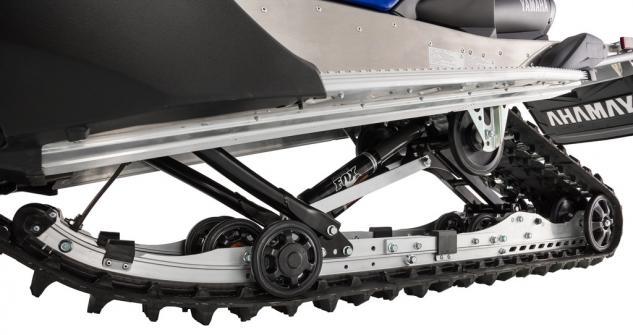 Yamaha’s new SingleShot rear suspension offers nearly 14-inches of travel and tune-ability via a Fox Float extra volume air shock.
Yamaha’s new SingleShot rear suspension offers nearly 14-inches of travel and tune-ability via a Fox Float extra volume air shock.The SingleShot suspension allows Yamaha to fit the Apex X-TX with a 146-inch track length. The 2015 Apex X-TX with its Dual Shock CK rear suspension featured tip-up rear rails and could only accommodate a 144-inch track that resulted in more than two inches less overall suspension travel. The SingleShot design adds simplicity and can be used with more track lengths.
Admittedly the Monoshock rear suspension offered more tuning opportunities, but the simplicity of tuning the new SingleShot should be more than adequate. The front limiter strap is important for weight transfer to achieve or lessen ski lift. Frankly, you most likely won’t be playing with the limiter strap that much as it’s not a tuner-friendly thing to do for most riders. The addition of an external adjuster like the one Ski-Doo offers for its tMotion suspension would be nice. Likewise, the rail-mounted coupling blocks are not adjustable, but we’ll be truly surprised if some clever aftermarket entrepreneur doesn’t come up with an adjustable block design in the future.
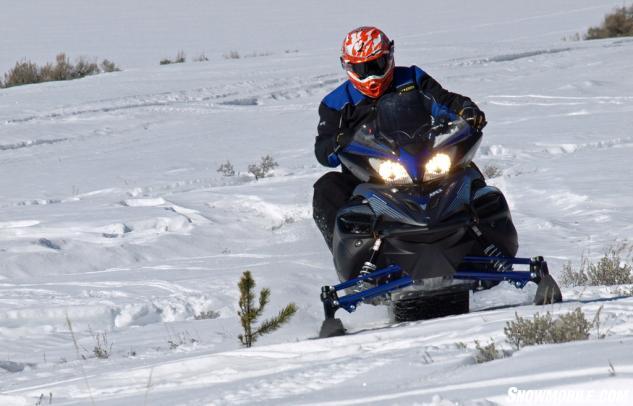 With potent and smooth Yamaha power, the X-TX uses a Camoplast track for on or off-trail grip.
With potent and smooth Yamaha power, the X-TX uses a Camoplast track for on or off-trail grip.Don’t get frustrated here by not having control rods or adjustable coupling blocks. Yamaha expects the SingleShot’s Fox Float 3 extra volume air shock to give you all the suspension tuning you’ll need through the suspension’s 13.8 inches of travel. As a serious power cruiser the Apex X-TX suspensions are now convenient to tune and with the air shock offer virtually an infinite amount of adjustability.
COMPARISON: Read our review of the 2016 Arctic Cat XF 7000 CrossTour
For the X-TX and the X-TX 1.75 you’ll find 36mm KYB high performance gas shocks fitted to the double A-arm front suspension. The Apex X-TX 1.75 LE preseason offering featured Fox Float front ski shocks. All X-TX models come with Yamaha’s proprietary Tuner skis.
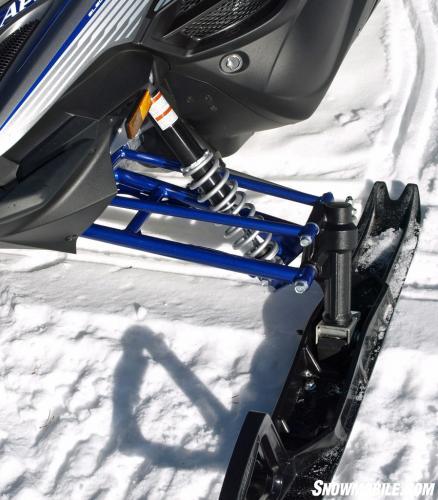 A set of 36mm aluminum high performance KYB gas shocks work with Yamaha’s double A-arm front suspension to keep the Tuner skis biting the trail.
A set of 36mm aluminum high performance KYB gas shocks work with Yamaha’s double A-arm front suspension to keep the Tuner skis biting the trail.We keep saying power cruiser. Let’s face reality, the Yamaha Apex X-TX in any of its iterations is heavy and not ideal for running for hours in deep, nasty mogul country. But it is excellent as a high speed runner over groomed trails, even end of the day rutted out ones.
Heavy, perhaps, but easily controlled, the Apex’ electronic power steering sees to that. While EPS doesn’t numerically lighten the Apex’ load, it does make the sled easier and lighter to steer in tight turns and sweepers. The Yamaha EPS provides more assist when slogging through miles of tight forested trails and eases the assist for long haul straights. The system does all of this without any effort by the driver. We have found Yamaha’s EPS works extremely well when riding long miles as it is efficient and gives you a light feel at the handlebars.
You can expect the Apex X-TX to handle extremely well and that you’ll feel in control thanks to the ergonomically engineered curvature in the handlebar. The bar droops at the ends to provide added confidence and purchase when pushing in the corners. You’ll also appreciate the extension of the handlebar’s heater materials on cold runs.
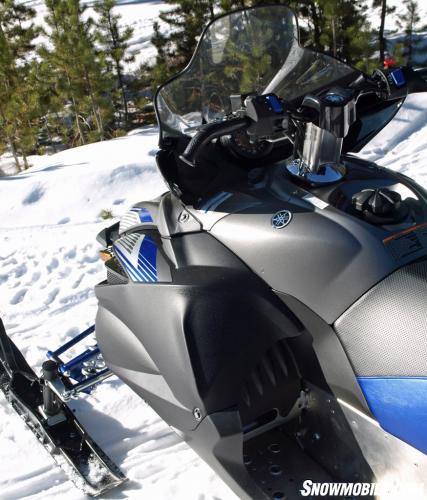 Yamaha’s ergonomic curved bars droop at the ends for improved rider control in the corners.
Yamaha’s ergonomic curved bars droop at the ends for improved rider control in the corners.Depending on where you ride, you might want to consider which of the X-TX versions you want to own. The base X-TX comes with a perfectly adequate 146-inch long Camoplast Ripsaw II track with 1.25-inch lug profile. But if you ride where it snows more often than the groomer can get out or run unplowed roads a lot, you might want to opt for the Apex X-TX 1.75 with its Backcountry track that features a taller 1.75-inch lug height. The price difference is only about US$100 between the two Apex X-TX versions.
COMPARISON: Read our review of the 2016 Polaris 800 Indy SP
Except for the Apex 1.75 LE that was only offered as a preseason special buy, the in-season Apex X-TX models offer serious value for power cruisers. The frame is a lightweight aluminum design and then there is the unique die cast framework designed for structural integrity and placement for the speed and torque-sensitive power steering system. The seat provides high mileage comfort and offers ride-forward positioning that lets you easily transition from sitting to standing. And, of course, the sled’s styling integrates smooth lines into wind-deflecting panels and windscreen. The instrumentation is easy to access and view as you ride. There’s onboard stowage and two DC outlets for accessories.
 No matter how tight the trail or slow the journey, Yamaha power assisted steering reduces your on-trail steering effort.
No matter how tight the trail or slow the journey, Yamaha power assisted steering reduces your on-trail steering effort.Without the 150-plus horsepower Genesis top performance four-cylinder powertrain, the Apex would be an above average cruiser, but with it, it becomes an all-star power cruiser with features and benefits unique to snowmobiling. And, then, there’s that wonderful wide open throttle sound that only this Yamaha can provide. That makes it THE power cruiser for model year 2016! When you hear it, you know the secret is out.
| 2016 Yamaha Apex X-TX Specs | |
| Engine | Yamaha four-cylinder, four-stroke high-performance 998cc; bore/stroke of 74.0mm/58.0mm; liquid-cooled; Mikuni throttle body electronic fuel injection system; dry sump lubrication |
| Horsepower | 150-plus (estimated) |
| Drive | Yamaha YVXC drive clutch with Yamaha driven; magnesium chaincase and cover |
| Front Suspension | (X-TX & X-TX 1.75) Yamaha double A-arm with 36 KYB HPG shocks; (X-TX 1.75 LE) Fox Float 3 shocks); up to 8.5-in of travel; Tuner skis |
| Rear Suspension | Yamaha SingleShot 146 parallel slide rail; aluminum high-pressure Fox Float 3 XV shock; up to 13.8-inches of travel |
| Brake | 4-piston hydraulic brake system with lightweight ventilated disc |
| Track | (X-TX) 15 x 146 x 1.25 Camoplast Ripsaw II (X-TX 1.75 and X-TX 1.75 LE) 15 x 146 x 1.75 Camoplast Backcountry |
| Length | 121.1 in |
| Width | 47.3 in |
| Height | 47.6 in |
| Ski Stance | 42.5 in |
| Weight | NA |
| Fuel Capacity | 9.2 Gal |
| Features | Digital gauge, push button reverse, electric start, hooked end handlebar, Tuner dual-keel ski |
| MSRP | US$14,499 |








 Your Privacy Choices
Your Privacy Choices